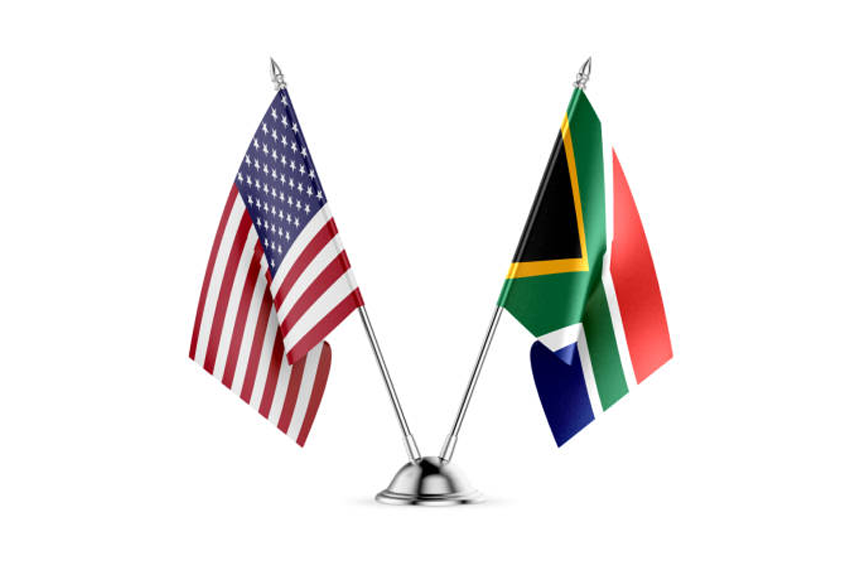With President Donald Trump’s divisive choice to stop financial help to South Africa, the nation finds itself at a crossroads in its relationship with the US. Trump’s assertion that South Africa was engaging “unjust and immoral practices” against the white minority Afrikaner community and cited its decision to open a genocide lawsuit against Israel in the International Court of Justice (ICJ) in December 2023 as a contributing factor has strained US-South Africa relations.
With analysts worried he may step further by ending the nation’s preferential access to the US market via the Africa Growth and Opportunity step (AGOA), his action has rocked South Africa.
How have the US and South Africa maintained diplomatic ties across years?
The two nations have usually kept good relations since apartheid ended in 1994 and Nelson Mandela was chosen as South Africa’s first black president. But given Mandela’s involvement in the anti-apartheid movement, the US required another 14 years to remove him from its “terrorist watch list”.
Just days after Trump’s inauguration last month, South African President Cyril Ramaphosa signed the Expropriation Bill into law, enabling the government to seize land without pay under specific conditions, therefore sparking fresh conflicts. Trump answered by withholding over $440 million in financial help, accusing South Africa of “confiscating land” and doing “terrible things, horrible things.” Last Friday, he signed an executive order formalizing the aid freeze.
What consequences follow from the aid freeze?
While the US embassy in South Africa stated that financing from Pepfar, an American program battling HIV/AIDS, would not be totally stopped, some initiatives under the program could still be impacted. With around 5.5 million people depending on Pepfar for antiretroviral medication, South Africa stands a significant beneficiary from the program.
In the ICJ case, Trump also charged South Africa of “a shocking disregard for its citizens’ rights” and of adopting “aggressive positions” against the US and her ally Israel. Conservative Afrikaner lobby groups like AfriForum and Solidarity hailed his commitment to assist Afrikaner immigrants moving to the US. Long advocating the abolition of black economic empowerment laws and South Africa’s affirmative action programs, these groups
Is the true problem South Africa's Land Reform Policy presents?
Trump has attacked South Africa’s land reform policy before this as well. During his first presidency, in 2018, he claimed that there was “large-scale killing of farmers” and that the government was “seizing land from white farmers”. Although these assertions were mostly refuted, the present executive order indicates a hitherto unheard-of rise in US-South Africa relations.
Political observer Dr. Oscar van Heerden said, “There has never been this kind of radical action taken to the point of an executive order being signed.”
Will South Africa lose its US preferential trade agreement?
Trade analysts think South Africa might not keep profiting from AGOA slated for review later this year. Although the US is among the main economic partners of South Africa, it is not the closest since the country also exports to China, India, and the European Union.
“My instinct is that whatever the reason Trump is upset with South Africa, at the moment AGOA would be the easiest mechanism to use to punish South Africa,” said Donald Mackay, CEO of Johannesburg-based trade consulting XA Global Trade Advisors.
Businesses who now profit from AGOA will suffer temporary losses should South Africa be excluded from it, but over time they should bounce back.
Regarding the crisis, how is South Africa handling?
For now, the government of Ramaphosa is choosing a diplomatic course. Still, given the Trump administration’s seeming lack of diplomatic interest, prospects for a resolution remain dubious.
Foreign Minister of South Africa Ronald Lamola has angrily rejected any idea of pulling out the ICJ case against Israel. “We remain firm that this is important for the world and the rule of law, even though occasionally standing by our values has consequences,” he said.
In his capacity as G20 president, Ramaphosa has launched a worldwide diplomatic outreach program with Washington as a major stop in order to help to lessen the consequences. But US Secretary of State Marco Rubio has already turned aside South Africa by skipping a next G20 foreign ministers’ conference in Johannesburg. “My job is to advance American’s national interests, not waste taxpayer money or coddle anti-Americanism,” Rubio said.
Can South Africa count on other world powers?
Key member of BRICS, an alliance including Brazil, Russia, India, and China aimed at offsetting Western power political and economic influence, South Africa is Given its US relationship in flux, South Africa might turn more and more to its BRICS allies for strategic and financial cooperation.
One of South Africa’s main commercial partners, the European Union has underlined its will to deepen relations despite the strains. President of the European Council António Costa recently gave Ramaphosa assurance on the backing of the EU.
What Further Actions South Africa Should Take?
According to Dr. Van Heerden, South Africa should “negotiate hard” and exploit its mineral exports as bargaining tool with the US. “South Africa has to consider very carefully how they handle this chess game,” he cautioned. “President Trump and Elon Musk already made the opening gambit.”
The world observes as the diplomatic impasse develops to see whether US-South Africa Relations can negotiate these choppy waters without compromising political or economic interests.




